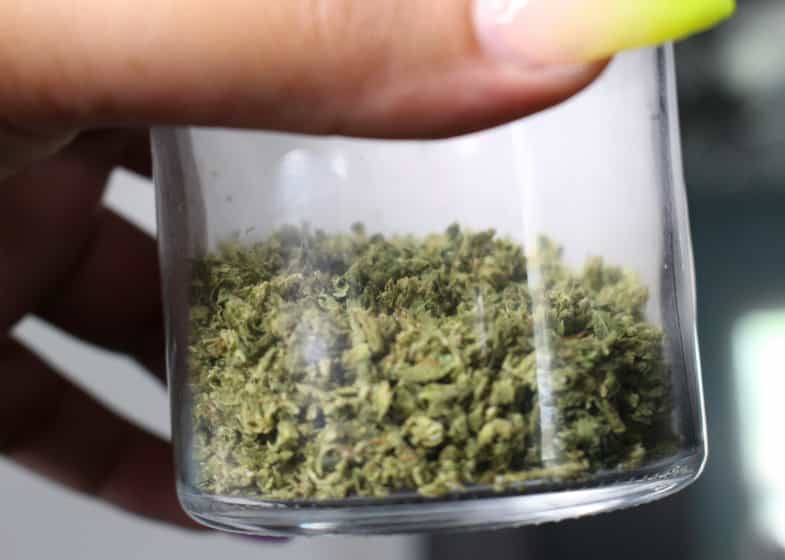Published on: 05/07/2024
Let’s discover HHC together, what its nature is and the benefits and properties that this complex cannabinoid can bring to health
In the vast and ever-changing landscape of natural cannabinoids, a new player emerges: HHC. A cousin of the two most famous ones, THC and CBD, hexahydrocannabinol has catalysed the interest of many curious people in the cannabis world due to its promising therapeutic properties and potential applications.
This substance is shrouded in an aura of mystery, but promises to be a source of real innovation in the therapeutic and even recreational fields. In this article, we aim to get to know it better, reveal its nature, examine its characteristics and compare them with those of the better-known THC. In short, we shed a little more light on this cannabinoid. Whether you are an expert in the field or an enthusiast of the subject, or simply eager to deepen your knowledge, you are in the right article.


What is HHC?
HHC, also known as hexahydrocannabinol, is a naturally occurring cannabinoid found as a component of cannabis in the Sativa variety. It has been found naturally in the plant since time immemorial and has always been part of human history. Yes, its presence is innate in the plant, but its traces are really infinitesimal, the percentage of presence is very low.
This is why HHC is replicated in the laboratory by hydrogenation of cannabis concentrates. This is why the adjective synthetic is often attached to HHC because it is obtained artificially in the laboratory.
Historical origins of HHC
The first person to synthesise HHC was, in the late 1940s, Roger Adams. He used natural THC from cannabis sativa and created the compound by adding hydrogen molecules in a process known as hydrogenation.
From then on, hexahydrocannabinol did not receive much attention; yes, another type of cannabinoid had been discovered, but everything remained in abeyance. This situation has begun to change in recent years thanks to the growing interest of some manufacturers who have started marketing it as an alternative to THC.
Today, HHC is considered a synthetic cannabinoid precisely because of its production process in the laboratory by hydrogenation, but its chemical structure is similar to that of THC. The main differentiator between the two is the hydrogenated carbon atoms present in hexahydrocannabinol.
We will elaborate on the differences between HHC and THC; now let’s see what benefits the synthetic cannabinoid can bring to our well-being.
Follow Justbob to learn more about the subject.
Read also: No, CBD oil (and other cannabidiol products) is not addictive. This is why
Benefits and therapeutic properties of HHC
An initial clarification is in order. Since HHC has only recently sparked interest among consumers and the curious, it is important to note that there is a lack of specific regulation aimed at ensuring the compound’s safe use for health. This is mainly due to the lack of in-depth analyses and studies on both its positive effects and possible contraindications resulting from its consumption.
Having said this basic premise, it is also important to emphasise that both the therapeutic benefits and undesirable effects found with HHC are quite similar to those of THC, albeit in a more attenuated form.
With regard to the therapeutic benefits and properties derived from the use of HHC, we list:
- Analgesic properties: HHC has the ability to reduce pain by acting on receptors in the nervous system.
- Anti-inflammatory properties: hexahydrocannabinol relieves inflammation in the body and acts on symptoms such as swelling and redness.
- Anti-emetic properties useful against nausea and vomiting: it can reduce or prevent these annoying discomforts, also providing relief for those suffering from gastrointestinal disorders or the side effects of medical treatments such as chemotherapy.
As for the side effects that HHC can cause, we have:
- Sensation of dizziness: one may feel unsteady or lurching, often accompanied by dizziness.
- Chemical hunger and exhaustion: feeling of sudden and uncontrollable hunger, but also a lack of energy and tiredness.
- Sense of intoxication and confusion: perceiving an alteration of reality, with difficulty in thinking clearly or orienting oneself.
- Increased sleepiness: one may experience drowsiness and increased desire to sleep at the expense of the ability to concentrate.
- Memory impairment: one has difficulty remembering even simple information.
- Euphoria and psychotic reactions: one perceives an increase in positive mood and feelings of happiness that may accompany psychotic states such as hallucinations or paranoia.
Both the benefits and possible side effects associated with the use of HHC are very similar to those found with THC. It is important to note that long-term use of HHC can, as with tetrahydrocannabinol, lead to physical and psychological dependence, as well as damage to the nervous system. This is proven by specific studies on the effects of synthetic cannabinoids on the body.
In our cbd online shop you can find really good alternatives to both HHC and THC.


HHC and THC: similarities and differences
Now, without going into too much detail, let’s look at the similarities and differences between HHC and THC.
The first commonality between the two is that both are cannabinoids, extracted from the sativa variety of the cannabis plant, and are able to interact with the human body’s endocannabinoid system.
We know that HHC exists in nature, albeit in very low quantities. For this reason, hexahydrocannabidiol is mainly produced in the laboratory through the process of hydrogenating THC, which is present in high quantities in the cannabis plant.
The main similarity between HHC and THC is the ability of both to produce psychotropic effects. THC is known for its strong psychoactive and euphoric effects. Those who have experienced HHC report experiencing similar sensations, but in a much lighter and less intense manner than after taking tetrahydrocannabidiol.
It should be remembered that reactions to substances and compounds are highly individual and depend largely on a person’s psychophysical state of health.
One of the reasons why interest in HHC has grown is that it offers the same benefits and positive effects as THC, but with less intense psychotropic effects, making it a more sustainable alternative to THC.
However, a significant distinction between the two relates to their source of origin and legal status. While THC is abundantly present naturally in the cannabis plant and subject to legal regulation in various parts of the globe, HHC is commonly synthesised in laboratories through a hydrogenation process. This not only affects its availability, but also the public perception of the cannabinoid compound.
Further clarifications on HHC and THC
It is important to emphasise that studies on HHC are still in their infancy, which means that limited information is available, especially regarding its possible long-term effects and therapeutic potential compared to THC.
The distinctions in chemical structure between HHC and THC undoubtedly influence their body metabolism, potentially leading to variations in the duration of their effects and their elimination from the body. Both show promising therapeutic benefits, such as the ability to reduce inflammation and alleviate pain, but the lack of extensive research on HHC limits our full understanding of its effects and compromises our perception of safety in the context of cannabinoids in general.
Dwell times in the body
Yes, there appears to be a clear difference in the length of stay in the body between HHC and THC. The former, being a synthetic cannabinoid, can stay in our system from a minimum of 24 hours up to a few days, with the actual duration varying depending on the dose and frequency of use.
THC, on the other hand, has a longer residence time: it can stay in the blood for up to two to three weeks, in urine for about a month and in hair even for about three months. Clearly, these estimates are approximate and influenced by various factors, such as the amount of THC consumed.
In general, the higher the dose, the longer the compound persists in the body and vice versa.
Read also: The story of the Hemp Body Car
Metabolisation of HHC
Let’s get straight to the point: HHC is metabolised by the liver into metabolites that accumulate in fat tissue. Consequently, an effective way to reduce the presence of HHC in our bodies is throughexercise. Exercising not only helps us keep our body weight under control, but also helps reduce the amount of hexahydrocannabinol in our bodies.
Another, more traditional approach to lower HHC concentrations is to increasewater intake to dilute the compound in blood and urine. It is also advisable to eat a balanced, high-fibre diet that includes legumes (such as chickpeas, beans, lentils) and cereals (including barley, maize and oats). These foods promote metabolism and the elimination of metabolites, including HHC, through the digestive system.
If you do not want to have any problems with either HHC or THC, we recommend the safer CBD oil.
What do we really know about HHC?
Currently, research on HHC is still lacking comprehensive and quantitatively significant studies on both short-term and long-term effects. This lack of data makes it difficult to confirm its safety and answer definitively. The evidence gathered so far has mainly come from consumers themselves, who do not seem to report significant problems with HHC use in terms of toxicity or side effects.
Consequently, it is too early to establish with certainty that there are no risks associated with this compound. Anyone interested in experimenting with products containing HHC should proceed with caution, taking care to choose high-quality options through careful selection.
Regarding the legality of HHC, it varies from country to country. Some countries or regions may have specific regulations governing the production, sale and use of HHC, while in others it may not be explicitly mentioned in cannabinoid laws.
Therefore, it is crucial to find out about local regulations before purchasing or using products containing HHC. In England for a short answer, it would appear to be legal to have a personal dose for use, but not legal to sell. The subject is complex and, as repeatedly stated, constantly evolving. We therefore recommend referring to institutional sites for regular updates on the subject.
Stay tuned to Just bob for all legislative developments.
Conclusions
In conclusion, the exploration of HHC has provided us with an in-depth analysis of its characteristics, origin and potential implications for human health. Although the compound has attracted attention for its promising therapeutic properties and possible applications, it is important to recognise that research on it is still in its early stages.
The lack of comprehensive and quantitatively significant studies limits our complete understanding of its short- and long-term effects, and advises us to be extremely cautious about its use.
Furthermore, while some consumers have not reported significant problems with the use of HHC, it is essential to proceed with caution and select high quality products, also considering local regulations governing its production, sale and use. In England, for example, it appears to be legal to personally possess but not sell the compound. However, given the evolving nature of the regulatory environment, it is advisable to consult official sources for updates on the subject.
Takeaways
- Hexahydrocannabinol (HHC) is a synthetic cannabinoid primarily produced in laboratories through the hydrogenation of THC, although it occurs naturally in trace amounts in Sativa cannabis plants.
- HHC exhibits similar therapeutic properties to THC, including analgesic, anti-inflammatory, and anti-emetic effects, but with reportedly less intense psychotropic effects.
- Consumption of HHC may lead to side effects such as dizziness, increased appetite, confusion, and memory impairment, similar to those associated with THC use.
- The legal status of HHC varies between countries, with some jurisdictions having specific regulations governing its production, sale, and use. In England, personal possession may be legal, but selling HHC products could be prohibited.
- Research on HHC is still in its early stages, limiting our understanding of its short- and long-term effects. Caution is advised when using HHC products, and individuals should stay informed about local regulations and seek high-quality options.
FAQ
What is HHC?
HHC, also known as hexahydrocannabinol, is a naturally occurring cannabinoid found as a component of cannabis in the Sativa variety. It is primarily produced in laboratories through the hydrogenation of THC, which is present in high quantities in the cannabis plant. While its presence in the plant is innate, its traces are very low, leading to synthetic replication in the laboratory.
What are the therapeutic benefits of HHC?
HHC exhibits therapeutic benefits similar to THC, including analgesic, anti-inflammatory, and anti-emetic properties. It can reduce pain, relieve inflammation, and alleviate symptoms such as nausea and vomiting.
What are the similarities and differences between HHC and THC?
HHC and THC are both cannabinoids extracted from the cannabis plant, capable of interacting with the human body’s endocannabinoid system. They produce psychotropic effects, with HHC reported to offer similar benefits to THC but with less intense psychoactive effects. However, a significant distinction lies in their source of origin and legal status, with HHC being synthesized in laboratories and subject to varying regulations.









